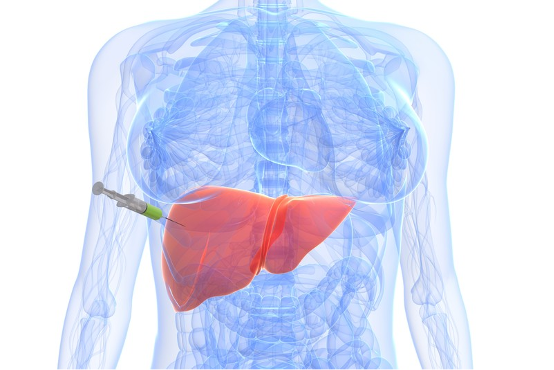Liver Biopsy Reveals Early Signs of Rapid Metastasis in Pancreatic Cancer Patients
July 5, 2024
Source: drugdu
 494
494
 Only 10% of individuals diagnosed with pancreatic cancer will live beyond two years post-diagnosis. The ability to predict the timing and location of metastases could dramatically transform the treatment approach for pancreatic cancer, especially for those at high risk of metastasis. Now, researchers have employed liver biopsies—a small tissue sample taken for laboratory analysis—to identify cellular and molecular markers that might predict if and when pancreatic cancer will metastasize to the liver or other areas like the lungs.
Only 10% of individuals diagnosed with pancreatic cancer will live beyond two years post-diagnosis. The ability to predict the timing and location of metastases could dramatically transform the treatment approach for pancreatic cancer, especially for those at high risk of metastasis. Now, researchers have employed liver biopsies—a small tissue sample taken for laboratory analysis—to identify cellular and molecular markers that might predict if and when pancreatic cancer will metastasize to the liver or other areas like the lungs.
A study conducted by Weill Cornell Medicine (New York, NY, USA) and an international research group suggests that data from liver biopsies obtained at the time of pancreatic cancer diagnosis could inform personalized treatment plans, such as liver-targeted immunotherapies, to preempt the spread of cancer cells. The research team discovered in 2015 that pancreatic cancer cells emit substances that primarily target the liver to create a pre-metastatic niche that promotes the growth of new tumors. In the latest study, published in Nature Medicine on June 28, the researchers aimed to understand how these alterations prime their new location for cancerous colonization by collecting liver biopsies from 49 individuals who underwent surgery for early-stage pancreatic cancer. Additionally, liver biopsies were taken from 19 individuals who had surgery for non-cancerous reasons, such as the removal of benign pancreatic cysts.
The researchers performed extensive molecular, cellular, and metabolic analyses on these samples to determine if they could identify characteristics that either preceded or could potentially prevent future metastases in these patients. They observed that the livers of patients who remained free of cancer recurrence, with no signs of spread after at least three years, closely resembled those of individuals who had never had cancer. Conversely, patients who developed liver metastases within six months of diagnosis—a group with a dire prognosis and few treatment options—had livers filled with neutrophil extracellular traps (NETs), which are dense networks of DNA and enzymes from dying neutrophils, a type of immune cell. The presence of NETs, closely linked with imminent metastases and appearing early in disease progression, suggests that future radiological imaging might soon be able to detect these formations and identify patients at high risk of aggressive cancer spread.
The study also highlighted two other patient categories: those who would later develop metastases in the liver and those whose cancer would spread to other organs like the lungs. Patients whose cancer metastasized to non-liver organs exhibited robust immune responses against the cancer, with protective T cells and natural killer cells infiltrating their livers, and many immune-regulatory genes being activated. These patients, prone to metastases outside the liver, might benefit from immunotherapy to enhance their existing anti-cancer immune response. Conversely, patients whose cancers metastasized to the liver later on also showed an accumulation of immune cells, but these cells displayed signs of metabolic exhaustion. The researchers are now looking to confirm their results in a broader group of pancreatic cancer patients and explore whether this strategy could be applied to other cancers at the time of diagnosis.
“We hope to develop a tool for predicting which patients with colorectal cancer will go on to develop liver metastases based on the cellular, molecular and metabolic profiles of their liver biopsies,” said co-senior author Dr. Robert Schwartz, associate professor of medicine at Weill Cornell Medicine.
Source:
https://www.labmedica.com/pathology/articles/294801713/liver-biopsy-reveals-early-signs-of-rapid-metastasis-in-pancreatic-cancer-patients.html
Read more on
- China Sino Biopharmaceutical Signs Exclusive Licensing Agreement with Sanofi for Rofalcitinib March 4, 2026
- Gan & Lee Pharmaceuticals’ new PROTAC drug GLR2037 tablets have been approved for clinical trials to enter the field of prostate cancer treatment March 3, 2026
- AideaPharmaceuticals plans to raise no more than 1.277 billion yuan through a private placement to focus on the global clinical development of innovative HIV drugs March 3, 2026
- Giant Exits! Its Star Business Acquired March 3, 2026
- Focusing on cardiovascular and cerebrovascular diseases! OpenMediLead Medical Intelligence Dual Engines Launch Internal Testing, Connecting Drug Development and Clinical Diagnosis in a Closed Loop March 3, 2026
your submission has already been received.
OK
Subscribe
Please enter a valid Email address!
Submit
The most relevant industry news & insight will be sent to you every two weeks.



